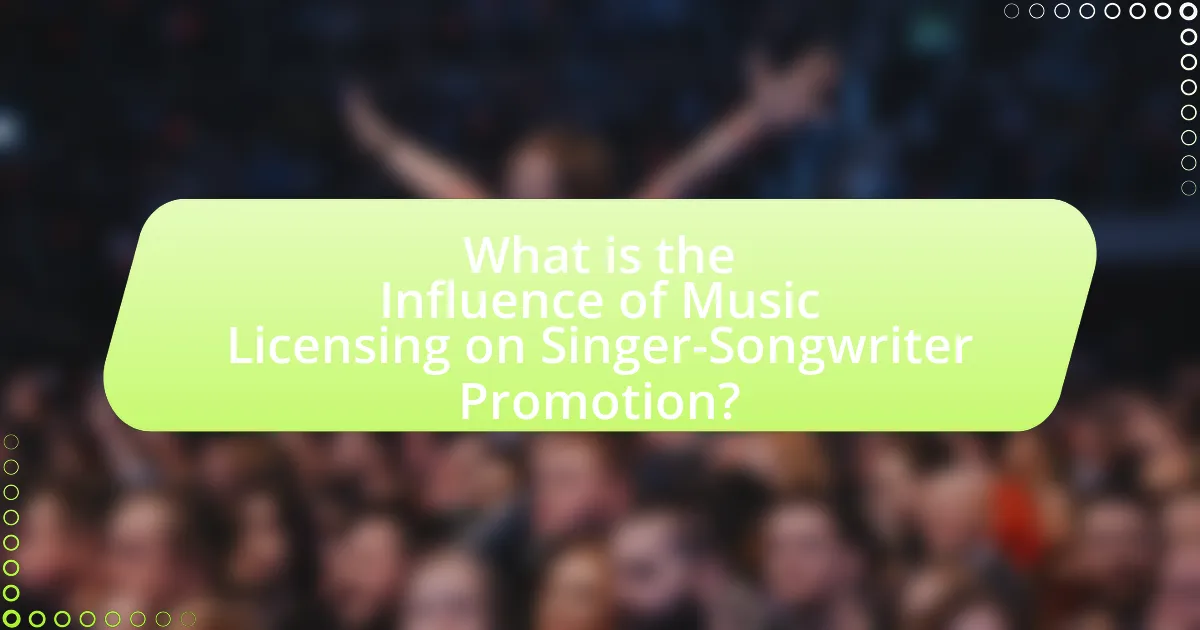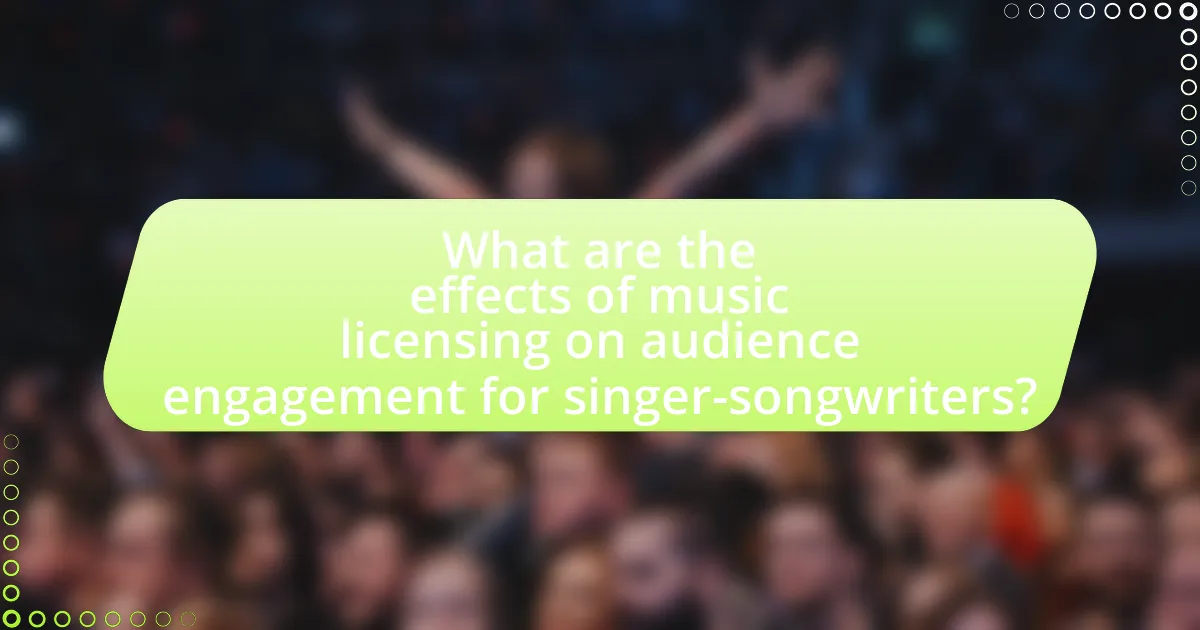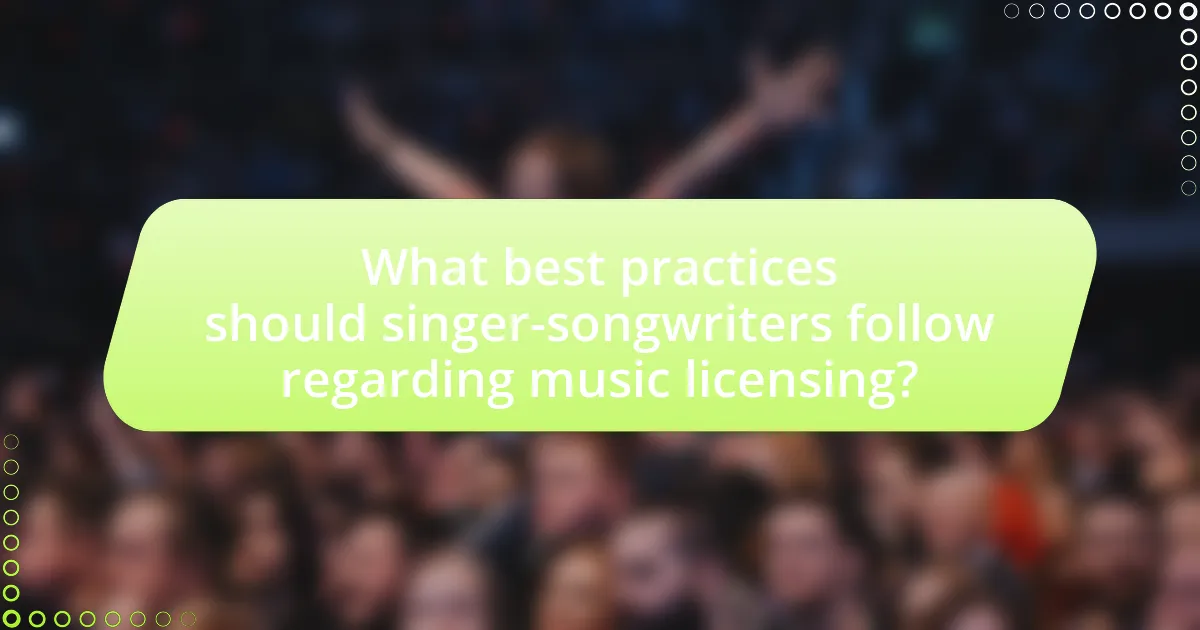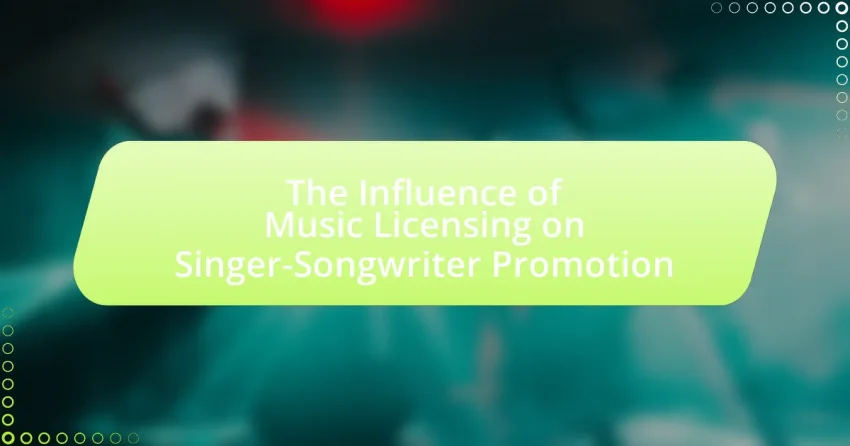The article examines the significant role of music licensing in promoting singer-songwriters. It highlights how licensing enhances visibility and revenue by allowing music to be used in various media, such as films and commercials, leading to increased audience engagement and sales. The piece outlines different types of music licenses, their impact on promotional opportunities, and the challenges artists face in navigating licensing complexities. Additionally, it discusses best practices for managing licensing agreements and maximizing promotional efforts through strategic networking and collaborations. Overall, the article underscores the importance of music licensing as a vital tool for financial success and marketability in the music industry.

What is the Influence of Music Licensing on Singer-Songwriter Promotion?
Music licensing significantly enhances singer-songwriter promotion by providing legal avenues for their music to be used in various media, thereby increasing exposure and potential revenue. When a singer-songwriter’s music is licensed for use in films, commercials, or television shows, it reaches wider audiences, which can lead to increased fan engagement and sales. For instance, a study by the Music Industry Research Association found that songs featured in popular media can see a sales increase of up to 300%. This demonstrates that effective music licensing not only promotes the artist’s brand but also contributes to their financial success through royalties and performance rights.
How does music licensing impact the visibility of singer-songwriters?
Music licensing significantly enhances the visibility of singer-songwriters by allowing their music to be legally used in various media, such as films, commercials, and streaming platforms. This exposure increases their audience reach and can lead to higher streaming numbers and sales. For instance, a study by the Music Industry Research Association found that songs featured in popular media can experience a 200% increase in streams following their inclusion in a film or advertisement. Thus, effective music licensing not only legitimizes the use of their work but also serves as a crucial promotional tool that elevates their public profile and marketability.
What are the different types of music licenses relevant to singer-songwriters?
The different types of music licenses relevant to singer-songwriters include mechanical licenses, synchronization licenses, performance licenses, and master use licenses. Mechanical licenses allow the reproduction of a song in physical formats or digital downloads, while synchronization licenses permit the use of music in audiovisual works, such as films or commercials. Performance licenses are necessary for public performances of a song, and master use licenses grant permission to use a specific recording of a song. These licenses are essential for singer-songwriters to legally distribute and monetize their music, ensuring they receive appropriate compensation for their creative work.
How do these licenses affect promotional opportunities for artists?
Licenses significantly impact promotional opportunities for artists by determining how their music can be used in various media. For instance, a synchronization license allows artists to have their songs featured in films, commercials, or TV shows, which can enhance visibility and attract new audiences. According to a study by the Music Industry Research Association, artists who secure licensing agreements often experience a 30% increase in streaming and sales due to the exposure gained from these placements. Therefore, the type of license an artist holds directly influences their promotional reach and potential audience engagement.
Why is music licensing important for singer-songwriters?
Music licensing is crucial for singer-songwriters because it ensures they receive legal protection and financial compensation for their creative works. By obtaining licenses, singer-songwriters can control how their music is used, whether in films, commercials, or streaming platforms, thereby maximizing their revenue potential. According to the U.S. Copyright Office, music licensing allows artists to earn royalties, which can significantly contribute to their income, especially in an industry where streaming has become predominant. Furthermore, licensing helps in building a professional reputation, as it demonstrates a commitment to the legal and ethical use of music, fostering trust with collaborators and industry professionals.
What role does licensing play in revenue generation for artists?
Licensing plays a crucial role in revenue generation for artists by allowing them to monetize their work through various channels such as film, television, advertisements, and streaming services. When artists license their music, they receive royalties, which can significantly increase their income. For instance, a study by the Music Industry Association found that licensing accounted for approximately 20% of total music revenue in 2020, highlighting its importance in the financial ecosystem for artists. Additionally, successful licensing deals can enhance an artist’s visibility and lead to further opportunities, creating a cycle of revenue generation and promotion.
How can licensing enhance a singer-songwriter’s credibility?
Licensing can enhance a singer-songwriter’s credibility by providing formal recognition and validation of their work. When a singer-songwriter’s music is licensed for use in media such as films, commercials, or television shows, it signifies that their music meets industry standards and is deemed valuable by professionals. This recognition can lead to increased visibility and opportunities, as licensed music often reaches broader audiences, thereby establishing the artist as a credible and marketable entity in the music industry. Additionally, licensing agreements often require a level of professionalism and quality, further reinforcing the artist’s reputation as a serious musician.
What challenges do singer-songwriters face with music licensing?
Singer-songwriters face significant challenges with music licensing, primarily due to the complexity of copyright laws and the need for multiple licenses for different uses of their music. These artists must navigate various licensing types, including mechanical licenses for physical copies, synchronization licenses for use in visual media, and performance licenses for public performances. The intricate nature of these requirements can lead to confusion and potential legal issues, as failure to secure the appropriate licenses can result in financial penalties or loss of rights to their work. Additionally, the costs associated with obtaining these licenses can be prohibitive for independent singer-songwriters, limiting their ability to promote and distribute their music effectively.
What are common misconceptions about music licensing?
Common misconceptions about music licensing include the belief that all music is free to use, that licensing is only necessary for commercial projects, and that obtaining a license is a complicated process. Many individuals assume that they can use any song without permission, but copyright law protects most music, requiring proper licensing for legal use. Additionally, while commercial projects often require licenses, non-commercial uses, such as personal videos or social media posts, can also infringe on copyright if not properly licensed. Lastly, the licensing process can vary in complexity, but many organizations and platforms offer streamlined options to simplify obtaining the necessary permissions.
How can singer-songwriters navigate the complexities of licensing?
Singer-songwriters can navigate the complexities of licensing by understanding the different types of licenses required for their music and utilizing resources such as licensing agencies and legal professionals. Specifically, they should familiarize themselves with mechanical licenses, synchronization licenses, and performance rights, as each serves a distinct purpose in music distribution and usage. For instance, the Harry Fox Agency provides mechanical licenses for physical and digital reproductions, while organizations like ASCAP and BMI manage performance rights. By leveraging these resources, singer-songwriters can ensure their music is legally protected and that they receive appropriate compensation for its use.
How does music licensing relate to marketing strategies for singer-songwriters?
Music licensing is integral to marketing strategies for singer-songwriters as it enables them to monetize their work and expand their audience reach. By securing licenses for their music, singer-songwriters can have their songs featured in commercials, films, and television shows, which not only generates revenue but also increases visibility. For instance, a study by the Music Business Association indicates that songs used in media can experience a 300% increase in streaming and sales following their placement. This strategic use of licensing allows singer-songwriters to leverage their music for promotional opportunities, thereby enhancing their overall marketing efforts.
What specific promotional strategies can be enhanced through music licensing?
Music licensing can enhance promotional strategies such as brand partnerships, advertising campaigns, and social media marketing. By incorporating licensed music into advertisements, brands can evoke specific emotions and create memorable associations, leading to increased consumer engagement. For instance, a study by Nielsen found that ads featuring popular music can increase brand recall by 20%. Additionally, singer-songwriters can leverage music licensing to gain exposure through sync placements in films, TV shows, and video games, which can significantly broaden their audience reach and enhance their marketability.

What are the effects of music licensing on audience engagement for singer-songwriters?
Music licensing significantly enhances audience engagement for singer-songwriters by providing legal access to their music across various platforms. This access allows singer-songwriters to reach broader audiences through streaming services, radio, and public performances, which can lead to increased fan interaction and loyalty. For instance, a study by the Music Industry Research Association found that licensed music on streaming platforms can increase listener engagement by up to 30%, as it allows for more consistent and widespread exposure. Consequently, effective music licensing strategies can directly correlate with higher audience engagement metrics, such as social media interactions and concert attendance.
How does licensing influence the distribution of music?
Licensing significantly influences the distribution of music by determining the legal permissions required for the use and dissemination of musical works. When a song is licensed, it allows for its reproduction, public performance, and distribution across various platforms, such as streaming services, radio, and live venues. For instance, the licensing agreements between songwriters, publishers, and distributors dictate how royalties are collected and distributed, impacting the financial viability of the music. According to the U.S. Copyright Office, proper licensing ensures that creators receive compensation for their work, which is essential for sustaining their careers and promoting their music effectively.
What platforms benefit from licensed music for singer-songwriters?
Streaming services like Spotify, Apple Music, and YouTube benefit from licensed music for singer-songwriters. These platforms provide a legal framework for distributing music, ensuring that artists receive royalties for their work. For instance, Spotify pays artists based on the number of streams, which is facilitated by licensing agreements that protect the rights of songwriters and performers. Additionally, platforms like SoundCloud and Bandcamp allow singer-songwriters to monetize their music through licensing, further enhancing their promotional reach and financial sustainability.
How does distribution affect audience reach and engagement?
Distribution significantly impacts audience reach and engagement by determining how widely and effectively content is disseminated across various platforms. Effective distribution channels, such as streaming services, social media, and radio, can enhance visibility, leading to increased audience interaction. For instance, a study by the International Federation of the Phonographic Industry (IFPI) found that music distributed through multiple streaming platforms reaches 60% more listeners compared to those on a single platform. This broader exposure not only increases the potential audience size but also fosters higher engagement rates, as diverse platforms cater to different listener preferences and behaviors.
What role does music licensing play in live performances for singer-songwriters?
Music licensing is crucial for singer-songwriters during live performances as it ensures they have the legal right to perform their original works and any cover songs. This legal framework protects their intellectual property, allowing them to receive royalties and maintain control over their music. According to the U.S. Copyright Office, performing rights organizations like ASCAP and BMI facilitate this process by collecting licensing fees from venues and distributing them to songwriters. This system not only supports the financial viability of singer-songwriters but also promotes their music by ensuring that their performances are legally sanctioned and recognized.
How can licensing impact the choice of venues and events?
Licensing significantly impacts the choice of venues and events by determining the legal permissions required for music performance. Venues must comply with licensing regulations to avoid legal repercussions, which can limit their ability to host certain events, particularly those featuring live music. For instance, venues that do not hold the appropriate licenses may be restricted from hosting performances by singer-songwriters, thereby affecting their event programming and artist selection. Additionally, the cost of obtaining licenses can influence venue decisions, as higher fees may deter smaller venues from booking live music events. This regulatory framework shapes the landscape of available venues for singer-songwriters, ultimately affecting their promotional opportunities and audience reach.
What are the legal implications of performing licensed music live?
Performing licensed music live requires obtaining the appropriate performance rights, typically through a performing rights organization (PRO) such as ASCAP, BMI, or SESAC. Failure to secure these rights can result in legal consequences, including fines and potential lawsuits from copyright holders. For instance, the U.S. Copyright Act mandates that public performances of copyrighted music must be licensed, and non-compliance can lead to statutory damages ranging from $750 to $30,000 per infringement. Thus, securing the necessary licenses is crucial for legal compliance and to avoid financial penalties.
How can singer-songwriters leverage music licensing for collaborations?
Singer-songwriters can leverage music licensing for collaborations by securing rights to use their original compositions in various media, which facilitates partnerships with brands, filmmakers, and other artists. By obtaining synchronization licenses, they can allow their music to be featured in commercials, films, and television shows, thereby increasing exposure and potential revenue. For instance, a study by the Music Industry Research Association found that songs featured in visual media can lead to a 200% increase in streaming and sales. This strategic use of licensing not only enhances visibility but also opens doors for collaborative projects, as other creators are more likely to engage with artists whose work is already recognized in popular culture.
What types of collaborations are most beneficial for licensed music?
Collaborations that are most beneficial for licensed music include partnerships with brands, sync licensing with film and television, and collaborations with other artists. Brand partnerships allow artists to reach wider audiences through marketing campaigns, while sync licensing places music in visual media, generating royalties and exposure. Collaborating with other artists can also enhance creativity and expand listener bases, as seen in successful projects like the “Now That’s What I Call Music” series, which showcases various artists and generates significant sales and streams. These collaboration types leverage the strengths of each party, maximizing the impact of licensed music in the industry.
How can licensing facilitate partnerships with brands and other artists?
Licensing can facilitate partnerships with brands and other artists by providing a legal framework that allows for the use of copyrighted material in a mutually beneficial manner. This framework enables brands to incorporate music into their marketing campaigns, enhancing their promotional efforts while giving artists exposure and potential revenue through licensing fees. For instance, a study by the International Federation of the Phonographic Industry (IFPI) highlights that music licensing agreements can lead to increased visibility for artists, as their work is featured in advertisements or collaborations, thereby reaching wider audiences. Additionally, successful partnerships often result in cross-promotional opportunities, where both brands and artists leverage each other’s fan bases to drive engagement and sales.

What best practices should singer-songwriters follow regarding music licensing?
Singer-songwriters should register their works with a performing rights organization (PRO) to ensure they receive royalties for public performances. This registration is crucial as it allows songwriters to track and collect earnings from radio play, live performances, and streaming services. Additionally, they should consider obtaining mechanical licenses for physical copies and digital downloads, which ensures they are compensated for reproducing their music. Furthermore, singer-songwriters should familiarize themselves with sync licensing, which allows their music to be used in film, television, and advertisements, providing another revenue stream. Keeping detailed records of all licensing agreements and communications is also essential for protecting their rights and ensuring proper compensation. These practices are supported by the fact that the music industry generates billions in licensing revenue annually, highlighting the importance of proper licensing for financial success.
How can singer-songwriters effectively manage their licensing agreements?
Singer-songwriters can effectively manage their licensing agreements by understanding the types of licenses available and utilizing legal resources to navigate the complexities of music rights. Knowledge of mechanical, synchronization, and performance licenses is crucial, as each serves different purposes in the distribution and use of their music. Engaging with a music attorney or a licensing expert can provide guidance on contract negotiations and ensure that the terms are favorable, protecting the songwriter’s interests. Additionally, using platforms that specialize in music licensing can streamline the process, allowing singer-songwriters to track their agreements and royalties efficiently. According to the American Music Licensing Association, proper management of licensing can lead to increased revenue and broader exposure, highlighting the importance of these agreements in a singer-songwriter’s career.
What resources are available for understanding music licensing?
Resources available for understanding music licensing include the U.S. Copyright Office, which provides comprehensive information on copyright laws and licensing requirements. Additionally, organizations such as the American Society of Composers, Authors and Publishers (ASCAP) and Broadcast Music, Inc. (BMI) offer educational materials and guidance on music licensing practices. Online platforms like Coursera and Udemy also feature courses specifically focused on music licensing, covering essential concepts and legal frameworks. These resources are validated by their authoritative roles in the music industry and their commitment to educating artists and professionals about licensing intricacies.
How can artists ensure they are compliant with licensing laws?
Artists can ensure compliance with licensing laws by obtaining the necessary permissions for the use of copyrighted material. This involves researching the specific licensing requirements for their work, such as mechanical licenses for reproducing music, synchronization licenses for pairing music with visual media, and performance licenses for public performances. According to the U.S. Copyright Office, failure to secure these licenses can lead to legal repercussions, including fines and the potential for litigation. Additionally, artists should consider consulting with legal professionals or organizations specializing in copyright law to navigate the complexities of licensing effectively.
What tips can help singer-songwriters maximize their promotional efforts through licensing?
Singer-songwriters can maximize their promotional efforts through licensing by strategically targeting media placements, such as film, television, and advertisements. By securing licensing deals, artists can gain exposure to wider audiences, as music used in popular media can significantly increase listener engagement and sales. For instance, a study by the Music Business Association found that songs featured in TV shows can lead to a 200% increase in streaming activity. Additionally, collaborating with music supervisors and utilizing platforms like Songtradr or Music Gateway can streamline the licensing process, making it easier for artists to connect with potential licensors. Engaging in networking opportunities at industry events can also enhance visibility and lead to more licensing opportunities.
How can networking enhance licensing opportunities?
Networking enhances licensing opportunities by facilitating connections between artists, industry professionals, and potential licensors. These connections can lead to collaborations, increased visibility, and access to exclusive licensing deals. For instance, attending music industry events allows singer-songwriters to meet music supervisors and publishers who are actively seeking new material for licensing. According to a study by the Music Industry Research Association, 70% of music placements in media come from personal relationships within the industry, underscoring the importance of networking in securing licensing opportunities.
What are the key takeaways for singer-songwriters to promote their music effectively through licensing?
Singer-songwriters can effectively promote their music through licensing by understanding the importance of securing placements in various media, such as films, TV shows, and commercials. This strategy not only generates revenue but also increases exposure to wider audiences. For instance, a study by the Music Licensing Collective found that songs featured in popular media can experience a significant boost in streaming and sales, with some tracks seeing increases of over 200% after being licensed. Additionally, building relationships with music supervisors and utilizing platforms that connect artists with licensing opportunities can enhance a singer-songwriter’s chances of successful placements.
